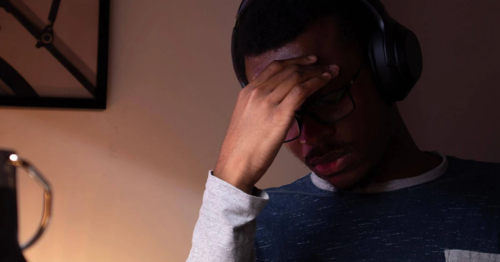
Table of Contents
How to Identify Burnout — and How to Recover From It

Written By: Sarah Fielding

Clinically Reviewed By: Clary Figueroa
Updated: September 23, 2024
6 min.
When you’re dealing with burnout, it can feel impossible to add anything to your plate. But these (therapist-approved) tips will actually help you feel a bit better.
Learn more about our Clinical Review Process
Table of Contents
Sometimes, the demands of school, work, and personal responsibilities can spike your stress level, making you feel like you’re constantly treading water and struggling to stay afloat under the many things weighing on you. This experience might be burnout — a state of physical, emotional, and mental exhaustion caused by prolonged stress. According to Charlie Health Clinical Supervisor Tracye Freeman Valentine, LPC-MHSP, burnout often results from workplace stress, but it’s generally accepted that other factors can cause burnout, too.
But burnout doesn’t need to be a constant state of being. Coping techniques and stress management can help you deal with and overcome the trials you’re experiencing. Read on to learn more about how to recognize the mental and physical health signs of burnout and, importantly, how to recover from burnout.

Learn self-care skills to prioritize your mental health
Find out today if our virtual treatment program is right for you.
Signs of burnout
Burnout can look like a lot of things, from forgetting about meetings to not having any energy to make plans after work. Below, we break down signs of burnout into two categories: mental and physical health. According to Charlie Health Senior Primary Therapist Sarah Lyter, LCPC, MA, and Freeman Valentine, burnout can include the following mental and physical health symptoms.
Mental burnout symptoms
- Feeling drained
- The sensation of being separated from the job
- Inability to experience things that usually cause enjoyment
- Irritability and frustration
- Symptoms of anxiety or depression
- Forgetfulness or difficulty concentrating
- Overwhelming sense of negativity
- Low self-worth
Physical burnout symptoms
- Fatigue
- Headaches
- Muscle pain
- Digestive problems and nausea
- Appetite changes
- Sleep issues
- Palpitations
- Regular illnesses
What causes burnout?
As detailed above, burnout is generally associated with work stress. First, let’s dive into the full impact work can have on experiencing burnout. Anyone who has gone to work (or school) has likely felt or at least witnessed burnout. It’s easy to feel drained, frustrated, and fatigued — to name a few — after long days of work, especially when it continues through taxing homework or catching up on assignments after hours.
According to Lyter, some of the factors at work that can contribute to burnout include a heavy workload, unclear job expectations, monotonous tasks, compassion fatigue, and toxic work environments. Unsure if work stress is the culprit? Freeman Valentine recommends asking yourself questions like, “Do you feel that you receive fair and equitable treatment in your workplace?” and “Does your workload match your capacity and ability, and do you have time for rest, recovery, and growth?”

While workplace burnout is a tremendous factor, other factors come into play (it is called work-life balance, after all). Your home life can also be a contributing force to burnout. Maybe you’re undergoing something significant like a move, remodel, or a new baby or pet. According to Charlie Health Primary Therapist Alysson Thewes, LCSW, experiencing significant stressors and unhappiness at home can also cause workplace burnout “as one feels, for instance, unable to balance the mental effort of both or devote time to solving the home issues at hand.” Lyter adds that additional factors that can cause burnout include chronic stress, low resilience, a lack of self-care, poor time management, overcommitment, poor boundaries, and perfectionism.
How to recover from burnout
Once you’ve determined you’re experiencing burnout and know what might be causing it, you can work to recover from it. One of the best coping strategies to implement? “Set boundaries. Set boundaries. Set boundaries,” emphasizes Thewes. Freeman Valentine seconds that. “Learning to detach yourself from your workplace and make a boundary such as turning off devices and not answering emails and notifications after hours is a great plan,” she says. “This leads to having control, which is sometimes not possible without boundaries. Control allows one to enjoy their life away from work and to operate on their set of rules and expectations without stress.”
Creating boundaries and reducing burnout could require standing up for yourself. You might need to delegate tasks at work and home to reduce what’s on your plate, explains Thewes. You might also need to speak with your manager to advocate for more work-life balance and other necessary changes — like when can they hire a new person to pick up the slack?
A range of self-care and grounding relaxation techniques can also help. According to Lyter, it can be beneficial to explore coping strategies such as:
- Taking regular breaks
- Practicing mindfulness
- Meditating
- Doing deep breathing exercises
- Trying guided visualizations
- Doing grounding techniques
- Journaling
- Doing easy, enjoyable activities
- Practicing gratitude
Freeman Valentine notes, “Understand that burnout often correlates with depression and anxiety, so after implementing a few plans and there is no recovery and reignition of what was once enjoyable, please reach out to a medical or mental health professional.” “Scheduling several sessions with a licensed mental health therapist can be very helpful in navigating the tumultuous waters of burnout,” Thewes seconds.
How to help someone else recover from burnout
Do you know someone who is experiencing burnout and needs a helping hand? There are a few ways you can help people in your life overcome burnout — just make sure you don’t stretch yourself too thin in the process. Here are some steps Lyter recommends you take:
- Provide empathy and support
- Create, as much as you can, a low-stress environment for them
- Encourage small, manageable changes, like taking breaks or meditating
- Lighten their workload if you’re in a position to do so
- Serve as an example of self-care and work-life balance
- Help them engage in social connection
- Suggest contacting a mental health professional
Freeman Valentine notes that you can help hold your loved one accountable to their self-care plans and boundaries without adding more stress that they need to be perfect.
How to avoid future burnout
Unfortunately, societal structures mean you might experience burnout again in the future. However, there are steps you can take toward stress management and reducing burnout’s impact on you.
1. Hold your boundaries
“Hold strong boundaries. Listen to your inner voice when it is telling you to do something or not do something. Oftentimes, we ignore opportunities to draw boundaries because we ‘don’t want to be difficult,’” says Thewes. “But, over time, ignoring our own needs and ignoring the boundaries we should be putting into place causes more distress in the end, sometimes leading all the way to burnout.” One aspect of this is limiting your access to technology and work applications when off the clock.
2. Prioritize yourself and lean on the people around you
As Freeman Valentine says, “Having a support system, eating well, self-care, setting boundaries, breathing exercises, physical activity, educating oneself about burnout, and positive affirmations are just a few ways to avoid burnout.” Take time to plan a daily routine that involves physical activity, healthy habits, enjoyable breaks, and moments that keep your stress level down.

How Charlie Health can help
If you or a loved one are struggling with burnout, Charlie Health is here to help. Charlie Health’s virtual Intensive Outpatient Program (IOP) provides mental health treatment for people dealing with serious mental health conditions, including chronic stress, burnout, and more. Our expert clinicians incorporate evidence-based therapies into individual counseling, family therapy, and group sessions. With this kind of holistic online therapy, managing your mental health is possible. Fill out the form below or give us a call to start healing today.




